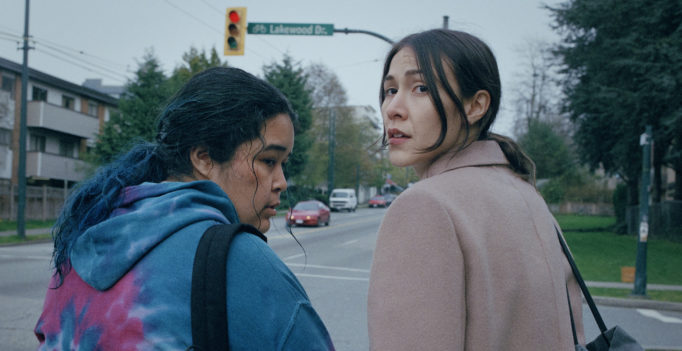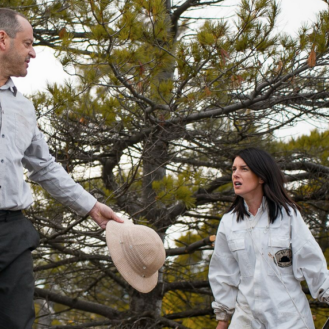Walking home on a dreary day in Vancouver, Áila (Elle-Máijá Tailfeathers) finds herself in the middle of an altercation between a surly man and a meek Indigenous woman. The woman, Rosie (Violet Nelson), has been roughed up. With instinctual grace and with Rosie’s permission, Áila steps in and separates Rosie from this argument, and invites the stranger into her house for safety and comfort.
The Body Remembers When the World Broke Open documents a connection between passing ships under critical circumstances. The film is loosely adapted from a real-life confrontation experienced by Elle-Máijá Tailfeathers and, from watching this movie she’s co-directed with Kathleen Hepburn, the audience can tell she’s been haunted by this memory. This explains why the film feels like someone recounting the intimate details of a personal story. There’s a lot of emphasis on the actual act of saving someone from threatening behaviour, as well as the awkward silences after the quarrel has been defused and multiple failed attempts have been made to find closure around this emergency.
In the film, Rosie seems to have found her own closure, but it involves submerging herself back into a toxic environment because, ultimately, she’s used to her prayers not being answered. The film doesn’t disparage her heavy thoughts, but Rosie’s behaviour is supposed to help viewers understand the perspective of a victim living through abuse. Áila’s perspective is inspirational and, although it feels like she isn’t getting through to Rosie, we can tell the Rosie appreciates Áila’s contributions.
The slight hindrance with The Body Remembers When the World Broke Open is with its choice of storytelling. In order to establish this blooming relationship organically, the film moves at the same speed as the strangers; meaning the film is mostly made up of seemingly unedited, long takes. It’s a bold technical decision that the film pulls off rather well, but also in a way that occasionally overshadows the significant screenplay and the raw performances. It’s a quiet, drawn out film that somehow manages to be boastful as well.
I still fall towards recommending this important film, though, because I recognize it has the power to inspire pro-active behaviour. Kathleen Hepburn (Never Steady, Never Still) and Elle-Máijá Tailfeathers have certainly earned their clout as well-prepared and honest filmmakers as a result of this film. I just wish they demonstrated their talents in a less dicier way that could’ve compromised their film as a potential gimmick.
**********
Do You Tweet? Follow These Tweeple:
Addison Wylie: @AddisonWylie





Be the first to comment